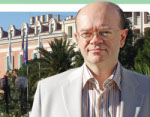Nice Premium: What do you think of the City’s policy on waste management?
André Minetto: There are different themes. First, we need to reduce waste at the production stage to have fewer packaging materials. This happens, for example, when we buy from organic stores. We’ll have degradable packaging, little cardboard, almost no plastic, no over-packaging. The less packaging there is, the less waste there is already when we purchase a good, and the less we’ll have to throw away later. Next comes the lifespan of the product, and in terms of food, there is the technique of composting, a use of household and food waste, which is an interesting concept. In this respect, one good thing is that the City of Nice distributes composters to people who have gardens, but you need to have a garden to get a composter. Yet there is still waste production when you have a family of two, three, or four people that could accommodate small composters even in apartments. Regarding waste, we have two ways of processing it: either landfill or incineration. The landfill system is bad. Moreover, we send our waste outside the department. For instance, to Bouches-du-Rhône. We offload our waste outside our department. Then incineration is even worse because it poses a proven toxicity problem. There is a significant health risk. It’s a disastrous solution. As long as the City’s policy is based on incineration and landfills, it is insufficient and negative.
NP: Do you think the City raises enough awareness among residents about recycling?
AM: A recycling system has been set up. It’s average and it seems like we are resting on that. There isn’t necessarily follow-up afterward and improvement of recycling with several bins. The result is average.
NP: In your opinion, what actions should be taken to encourage citizens to recycle more?
AM: First, show them the cost to a community and the part of local taxes. Waste disposal and transportation are very costly. Then show them the ecological cost. When we transport our waste to Marseille, for example, it’s done by truck. Thus, there is a significant carbon and financial cost. This is a considerable element. Seeing that we produce 517 kilos of waste per year per person is something enormous. These transports by truck, for example in Bouches-du-Rhône, will cost the department 3 million euros per year.
NP: What actions would you recommend for better waste management?
AM: First, act on consumers to buy goods with less over-packaging. Also, encourage producers to use less packaging, less over-packaging. Avoid plastics and everything not biodegradable. Control waste and then reuse it more extensively.
NP: Precisely, can you tell me why it is important to sort waste?
AM: To recycle them, because it has a cost when we incinerate them. There is an energy cost. Then there are significant expenses for communities. The fewer waste we have, the more we reuse and recycle them, the better it is.
NP: Do you think the people of Nice are aware that they need to sort their waste?
AM: It needs to be explained. If we explain it to the citizen, they are capable of understanding and will do it more willingly. We must not impose it on them by saying it will be more expensive. It requires pedagogy. Sorting waste is not necessarily something natural. It’s starting to happen, but we see that some people groan a bit. The cost of waste treatment is increasing, and people are asked to sort. It also needs a pedagogical side.


